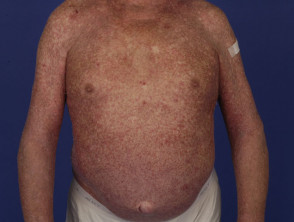DermNet provides Google Translate, a free machine translation service. Note that this may not provide an exact translation in all languages
Quiz
Cutaneous adverse reactions – 10 cases
Cutaneous adverse reactions to medications are common; many are non-immunological in nature. This quiz considers some drug eruptions believed to be immunologically-mediated ('drug allergy'), or that are at least idiosyncratic in nature.
Often it is difficult to be certain whether a rash is due to drug, a skin disease or an underlying illness. A careful drug history is essential, considering prescription and over-the-counter medicines, topical agents, herbal remedies and supplements. Previous exposure, dose, duration and frequency of drug administration should be established. Refer to standard textbooks and obtain specialist advice from a dermatologist as necessary.
For each of the ten cases, study the image(s) and then answer the questions. You can click on the image to view a larger version if required.
Each case should take approximately 2 minutes to complete. There is a list of suggested further reading material at the end of the quiz.
When you finish the quiz, you can download a certificate.
Case 8
Sign up to the newsletter
© 2024 DermNet.
DermNet does not provide an online consultation service. If you have any concerns with your skin or its treatment, see a dermatologist for advice.
